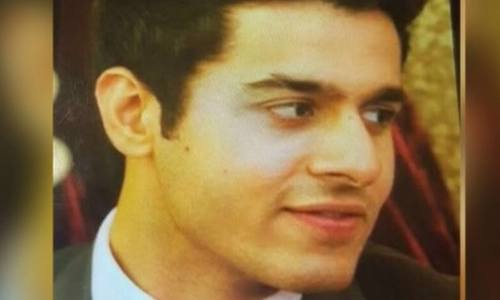KARACHI: The Supreme Court on Monday expressed extreme displeasure over the manner in which the Karachi police handled the kidnapping case of Awais Ali Shah, son of the Sindh High Court chief justice, with one of the bench members observing that the SHO concerned did not even bother to visit the crime scene after himself concluding that it was a job of spy agencies.
A three-judge bench of the apex court headed by Chief Justice of Pakistan Anwar Zaheer Jamali conducted the suo motu proceedings on the kidnapping of the SHC CJ’s son at the Karachi registry. The other bench members were Justices Amir Hani Muslim and Khilji Arif Hussain.
Justice Hani remarked that a man had gone to the police station, but the SHO was not available.
“When the SHO came to know about the incident, he himself concluded that it could have been a job of secret agencies’ personnel without even visiting the crime scene.”
The bench members also criticised former SSP-South Dr Farooq Ahmed and told him that he did not deserve to remain in police uniform in view of his negligence.
To court queries, the SSP said that he spoke to the area SHO at around 7.15pm. He said that he did not inform the DIG-South and IGP about the incident.
One of the bench members asked him why he did not take any action till 9.30pm when the SHC chief justice himself brought the matter to the knowledge of the IGP.
The bench noticed with grave concern the casual attitude of SSP Farooq in response to its queries.
It observed in the order: “He in spite of the information of kidnapping, which he received well in time, has taken no steps to trace the culprit nor did he intimate his high-ups for which he would not offer any plausible explanation.”
After a break, Advocate General Zamir Ghumro informed the judges that the provincial government would immediately order him to report to services and general administration department.
“We expect that conduct of said police officer shall be looked into departmentally and proper action, if necessary, will be taken against him and a report shall be submitted to this court within two weeks,” the bench ordered.
SC wants IGP say in transfer, posting of policemen
The bench further expected from the government that due consideration would be given to the recommendation of the IGP while posting a new SSP-South, as the police chief was supposed to deal with the overall law and order situation in Sindh in extraordinary circumstances.
To a question, IGP A.D. Khowaja said his consultation was not always sought by the provincial authorities in posting of officers.
The advocate general argued that under Article 129 of the Constitution executive authority in the province had to be exercised by the chief minister and his cabinet.
He said that the powers of the CM or his cabinet could not be transferred to the IGP.
The chief law officer said that in fact the IGP had more powers than other departments.
He said that policing and local governments were provincial subjects and the federal government unconstitutionally legislated on these subjects and introduced the Local Government Ordinance 2001 and Police Order 2002 and included these laws in the sixth schedule of the Constitution till 2009.
The AG said that the provinces legislated on these subjects after 2009.
Earlier, the bench took up the implementation proceedings of the SC judgement on Karachi suo motu law and order case and inquired from the IGP about the untraced cases of heinous crimes.
The IGP submitted that some more cases had been traced out, but right now he was not in a position to submit the exact details before the bench.
At his request, two-week time was allowed to submit such a report
The bench also took up the issue of release of four convicts who were stated to be involved in heinous crimes.
The AG submitted a report pertaining to only three persons — Khalid Aziz, Abdul Rasheed and Junaid Ansari.
The bench observed that the reasons assigned for their release on parole were entirely unsatisfactory.
The bench was informed that all three of them were arrested on April 9 and sent to the Karachi central prison to serve out their remaining period of sentences.
As for the non-submission of a report about convict Muhammad Khan, no plausible explanation was offered by Director-Parole Saleem Raza, who has been holding the position for the last 10 years.
The bench also inquired about the presence of Niaz Abbasi, the then home secretary, during whose term of office these four persons were admitted to parole.
Chief Secretary Siddique Memon informed the bench that Mr Abbasi had proceeded to Saudi Arabia for umra.
The bench directed Mr Abbasi to be present in court on the next date of hearing to explain his position with regard to the release of the four persons on parole.
Moreover, the chief secretary was directed to look into the conduct of the director-parole as well as other members of the Parole Committee, “who have, prima facie, acted in a negligent manner in recommending release of these four convicts on parole, despite being convicted for heinous crimes and for no valid reasons”.
Besides, the bench ordered that other issues relating to law and order situation in the city, fitness of vehicles, land grabbing, kidnapping, terrorism, increase in street crimes, safety and security of the citizens and steps taken by the police and other agencies, will also be taken up on the next date of hearing, which is July 15.
Published in Dawn, July 5th, 2016













































